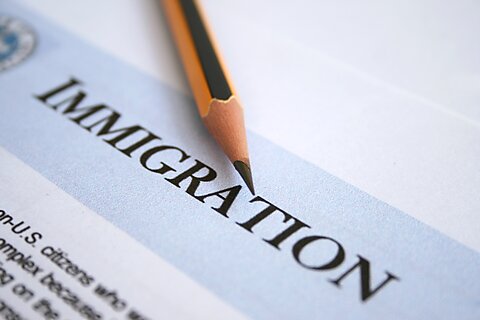
Angelo A. Paparelli and David J. Bier
With spring approaching, US businesses that sponsor noncitizen workers for employment‐based immigration benefits are accustomed to weathering seasonal changes. Most employers are likely ready for the initial FY 2025 H‑1B lottery registration season. But beyond the usual H‑1B registration pressures, these are the “[immigration] times that try [employer’s] souls.”
American businesses now face particularly inclement headwinds stirred up by US Citizenship and Immigration Services (USCIS), the Department of Homeland Security (DHS) component tasked with deciding immigration‐benefits requests. Here are the latest USCIS tempests:
Increased Premium Processing Fees
Effective February 26, 2024, the agency (with congressional authorization) imposed higher, inflation‐adjusted premium processing fees that must be filed to expedite an application. For example, premium processing of:
Form I‑129, Petition for a Nonimmigrant Worker, jumps from $2,500 to $2,805 for most temporary work visa categories, and
Form I‑539, Application to Extend/Change Nonimmigrant Status, rises from $1,750 to $1,965 for students, exchange visitors, and dependents of noncitizens in work‐visa status, and
Form I‑765, Application for Employment Authorization, scales from $1,500 to $1,685 for students requesting pre‐and post‐completion optional practical training (OPT) or a 24‐month STEM OPT extension.
Increased Standard Filing Fees
Effective April 1, 2024, a USCIS final rule increases standard filing fees on employment‐based nonimmigrant petitions (I‑129s) and immigrant petitions (I‑140s). The increase in fees for two of the most heavily used nonimmigrant work visa categories is substantial: H‑1B petitions (+70 percent, from $460 to $780) and L‑1 petitions (+201 percent, from $460 to $1,385, except for small employers and nonprofits). Although filing fees for immigrant petitions increase only 2 percent (to $715), Form I‑485 green card applications to adjust status to legal permanent residence jump 26 percent (from $1,140 to $1,440 for persons 14 and older, if not requiring biometric screening).
Added to the base fees for I‑129s and I‑140s is a $600 “Asylum Program Fee” (except that businesses with twenty‐five or fewer employees must pay only a $300 surcharge, and nonprofits need not pay this added fee). The final rule is effective on April 1, just in time for H‑1B petitions submitted on behalf of beneficiaries selected in the FY 2025 lottery. For next year’s H‑1B registrations (opening in March 2025), the fee will jump from $10 to $215—an increase of 2,050 percent.
New Mandatory (Not Ready for Prime Time) Forms
Likewise effective on April 1, 2024, USCIS requires that new versions of Forms I‑129 and I‑140 (nonimmigrant and immigrant employment‐based petitions) to reflect the higher filing fees be submitted. Although the agency, as of March 6, has not released published versions of the final forms (but only previews), it cautions that there “will be no grace period” if earlier versions are used instead.
New Online “Organizational Accounts”
USCIS also announced the launch on February 28, 2024 of H‑1B “organizational accounts,” which in theory will permit an employer, only one attorney in a law firm, and only that lawyer’s designated paralegals to collaborate in the H‑1B online lottery registration process. Although this new online platform promises to be an improvement over the current paper‐filing process, it will require several rounds of technical updates before it can be widely used, or expanded to other work visa categories.
As now configured, aside from the limits on participation by multi‐attorney law firms and paralegals assigned to more than one lawyer, the online system requires extensive manual data entry and editing of required information. It has no option for API integration with existing commercial immigration case‐management software solutions. These constraints will limit its potential for use by employers, attorneys, and their shared paralegals, who must submit registrations for multiple beneficiaries and later submit H‑1B petitions for cases selected in the lottery.
Continuing USCIS Illegal and Intrusive “Site Visits”
In its final fee rule, USCIS rejected public comments, including those of the Cato Institute, which challenged a $91.4 million (73.6 percent) payroll increase allocated to the USCIS Fraud Detection and National Security Directorate (FDNS) since 2016 to conduct investigations (euphemistically described as “site visits”) at employer businesses and worker residences. In doing so, the agency claimed that “FDNS’s work does not fall into ‘intelligence’ and/or ‘investigations’ work that the [Immigration and Nationality Act] assigned to [US Immigration and Customs Enforcement (ICE)],” and that, in any event, the issuance by the Secretary of DHS of Homeland Security Delegation No. 0150.1 expressly authorized USCIS to “investigate alleged civil and criminal violations of the immigration laws.” Apparently, USCIS thinks that when it “investigates,” it is not an “investigation.”
USCIS’s response to public comments omitted any discussion of relevant provisions of the Homeland Security Act of 2002 (HSA), which limited the actions of USCIS to engaging solely in the “adjudication” of petitions and applications seeking immigration benefits and naturalization (6 U.S.C. § 271(b)), and exclusively tasked another bureau, now comprised of ICE and US Customs and Border Protection, with the powers of immigration‐related investigations and intelligence gathering (6 U.S.C. § 251(3) and 6 U.S.C. § 251(4)).
Most importantly, the HSA prohibited the DHS secretary from recombining the two bureaus into a single agency or otherwise combining, joining, or consolidating functions or organizational units of the two bureaus with each other (6 U.S.C. § 291(b)).
USCIS is impermissibly using user fees meant for adjudications to conduct investigations that ICE could be doing using congressional appropriations. It will therefore likely require litigation to demonstrate that the USCIS/FDNS program of site visits is unlawful because Homeland Security Delegation No. 0150.1 was issued in violation of 6 U.S.C. § 291(b).
* * *
Despite the recent USCIS changes and the agency’s starkly increased fees, there is little reason for employers and their sponsored noncitizen workers to expect that USCIS’s service levels will soon improve, or that immigration backlogs will decline significantly. USCIS rejected Cato’s comments that the agency should tie any fee increases to shorter processing times, meaning that the agency is about to get substantially more money with virtually no accountability.
In responding to public comments on the fee rule, and in its other public actions, USCIS has apparently not heeded concerns that its adjudicators are taking substantially more time to decide cases, and issuing more requests for additional evidence; its petitions and applications have grown in page length (thus taking longer to decide); and its officers often ask for evidence possessed by third parties that have no voice or standing in a pending matter. Worse still, by continuing the FDNS/USCIS investigative site visit program even though it is unlawful under the HSA, and by opting for an asylum surcharge on employers’ petitions through an “ability‐to‐pay principle for determining user fees,” USCIS may well trigger a repeat of litigation challenging and enjoining the new filing fees, which will only prolong and exacerbate delays and backlogs.
From the perspective of American employers sponsoring noncitizens for immigration benefits, the weather in US immigration is very unseasonable.
Angelo Paparelli, a Partner in Vialto Law (US) PLLC, has received the highest peer rankings in immigration law over several years from Chambers USA, Chambers Global, Legal500, and Best Lawyers in America. An elected Fellow in the College of Labor and Employment Lawyers, he is a prolific blogger and policy advocate on the US immigration system, offering constructive solutions to help maintain and enhance America’s economic prosperity, political freedoms, and heritage as a nation of immigrants. This article reflects only the views of its authors.







